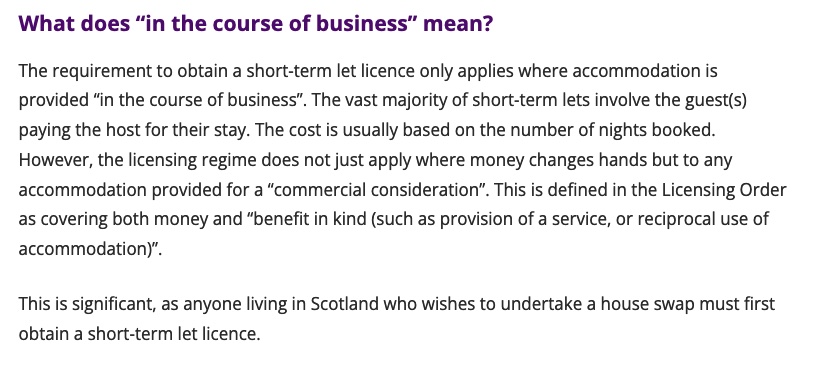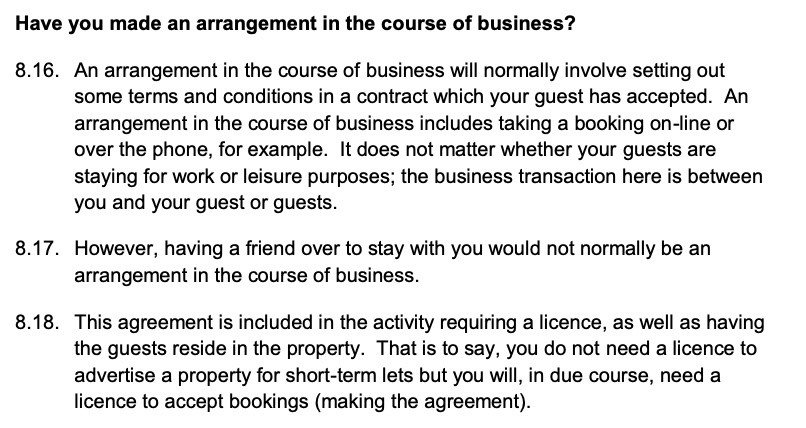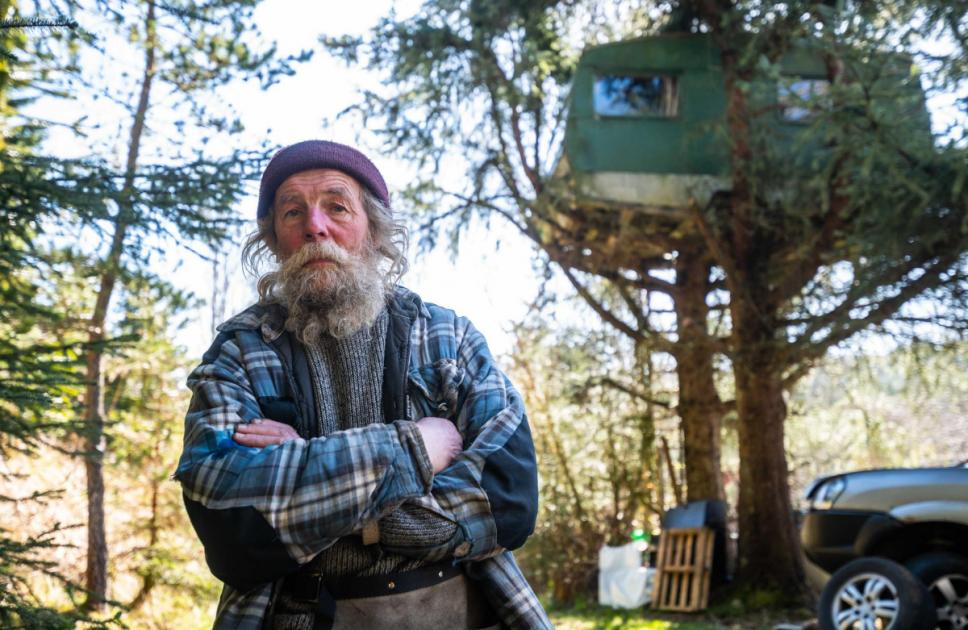Short-term Lets – do house swaps and house-sitting require a license?
The Civic Government (Scotland) Act 1982 (Licensing of Short-term Lets) Order 2022 obliges hosts and operators of short-term let accommodation to obtain a license in order to continue to be able to trade legally.
Excluded from the this requirement is mobile accommodation which, as the Scottish Government guidance states is accommodation
“which is capable of transporting your guests at the time of their stay. This would exclude, for example where you hire out canal boats or yachts. However, a previously mobile unit that had been immobilised, such as an old tractor or a caravan in a tree would not be excluded.”
My good friend Jake Williams (pictured above) is the only know operator of a caravan in a tree and it is good to see Government Guidance so specific and relevant.
But I digress, because not all the Guidance is as helpful.
Some weeks ago there was media coverage about how people who engaged in house swaps would have to obtain a license under the The Civic Government (Scotland) Act 1982 (Licensing of Short-term Lets) Order 2022
The story emerged from blog post by the Scottish Parliament’s Information Centre (SPICe).

SPICe is an excellent source of impartial and authoritative briefings on various policy and legislative matters but this paragraph is misleading in claiming that anyone wishing to undertake a house swap must obtain a license. The confusion arises because of the different context within which “in the course of business” and “commercial consideration” are used in the legislation.
Article 3 of the STL Order is as follows: –
Definition of short-term let and short-term let licence
- In this Order—
“short-term let” means the use of residential accommodation provided by a host in the course of business to a guest, where all of the following criteria are met—
(a) the guest does not use the accommodation as their only or principal home,
(b) the short-term let is entered into for commercial consideration,
(c) the guest is not—
(i) an immediate family member of the host,
(ii) sharing the accommodation with the host for the principal purpose of advancing the guest’s education as part of an arrangement made or approved by a school, college, or further or higher educational institution, or
(iii) an owner or part-owner of the accommodation,
(d) the accommodation is not provided for the principal purpose of facilitating the provision of work or services by the guest to the host or to another member of the host’s household,
(e) the accommodation is not excluded accommodation (see schedule 1), and
(f) the short-term let does not constitute an excluded tenancy (see schedule 1),
“short-term let licence” means a licence granted for the activity designated in article 4
The wording can set your head spinning.
A short term let is a short-term let if a series of things are not the case.
In Article 2 of the Order, “commercial consideration” is defined as including a) money and b) a benefit in kind (such as the provision of a service, or reciprocal use of accommodation).
So on first glance, house swaps require a license (we will deal with house-sitting later) because it is clearly a reciprocal use of accommodation.
But note the opening words of Article 3.
“short-term let” means the use of residential accommodation provided by a host in the course of business to a guest, where all of the following criteria are met—
Even if all of the criteria are met, residential accommodation can only be a short-term let if it is provided “in the course of business to a guest”.
And this is where the SPICe blog is misleading because it fails to highlight the over-arching significance of “in the course of business”.
So what does ”in the course of business mean? This is of fundamental importance to understanding whether any provision of accommodation is a short-term let and thus requires a license.
In the Policy Note that was published alongside the Order in 2022, there is a hint of the significance of the “course of business” condition.

But what does the term mean?
Unfortunately, it is not defined in Article 2 which otherwise defines various terms including “commercial consideration“. Nor is it as far as I know defined in any other legislation.
The Scottish Government Guidance to Hosts and Operators published on 30 June, does, however, provide some clue.

According to this guidance, the provision of accommodation “in the course of business” is not limited to arrangements entered into by businesses as conventionally understood but to any arrangement governed by any kind of terms and conditions.
So turning back to house swaps, they are explicitly captured by the condition in Article 3(b) as defined in Article 2 (“reciprocal use of accommodation”) and on the face of it require a license. But because of the over-riding condition in relation “in the course of business”, they may or may not require a license.
I do not know much about house swaps but I imagine that there is some form of written a agreement in place relating to the duration of the stay, obligations in relation to insurance, and possibly other agreements covering use of particular parts of the house or obligations to be discharged such as keeping the property locked at night.
if that is the case, the a license will be required if the (non-statutory) Scottish Government Guidance has any weight.
Turning to house-sitting of which I have a lot of experience, this is typically carried out where a host will be absent for a period and wishes someone to live in the house to look after pets, gardens and sometimes domestic animals such as hens and horses.
Like house-swaps these are voluntary arrangements entered into by private parties and not (until now) governed by any regulatory regime. But again, good practice is to set out in writing the basis of the agreement including how long the stay is for and what duties are to be performed.
So again, depending on what exactly “in the course of business” means, a license may be required.
it is deeply unsatisfactory that there should be this uncertainty and it is likely that only the courts will be able to sort it out.

The government of Scotland is communist. They went to tell people what to put in their bloodstreams, they went to replace parents with State appointed guardians, and they want to police whet people do with and even in their own principal residences. This is Soviet style State Control where no aspect of private or public life is any longer considered beyond the writ of a government dictat and bureaucrats to enforce if. Scotland will gradually wither under the weight of this government overreach as small businesses die and household incomes decline. The solution is to get out. Preferably of the UK as England is going Back to the USSR as well. .
Yawn
Totally ridiculous. Why does my tiny airbnb need an Energy Efficiency Certificate when the electricity and heating is included in the rent? What will my local authority do for the very high license fee? (Spoiler – nothing).
One of these days I may ask for that shirt back, but then again a better man suits it well.
This house swap thing is ridiculous. I know folks who sometimes go and stay with friends in the States and sometimes go when their friends are on holiday but not as a swap. Sometimes it is a swop. It could end up with one side staying three times and the other only once over a few years. So would it only count in years when there was a direct swop. You could go into a lot of nit picking detail with this. They are just friends doing each other a favour. I don’t see it as much different from “borrowing” a cup of sugar from your neighbour and at some time in the future reciprocating.
Even if the families swapping don’t know each other I wouldn’t consider it as a true financial transaction. You go to a hotel a pay for a room. Only the hotel makes a profit. In a swap both households are benefiting but in a sense, since both benefit then unlike the hotel the benefits being reciprocal could simply be considered to cancel out.
Why does the Scottish Government keep screwing up legislation by getting the “details” wrong. All the nitty gritty will be worked out by civil servants or lawyers. Are the “ministers” not sufficiently robust in dealing with there officials to tell them that this is just so much guff. Go away and rewrite it?